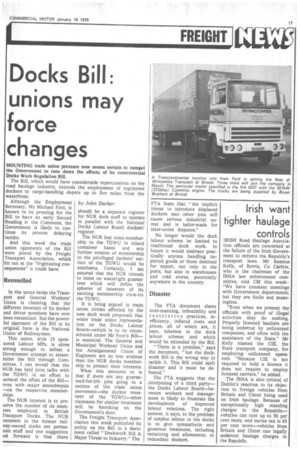Docks Bill: unions may force changes
Page 19

If you've noticed an error in this article please click here to report it so we can fix it.
MOUNTING trade union pressure now seems certain to compel the Government to tone down the effects of its controversial pocks Work Regulation Bill.
The Bill, which would have considerable repercussions on the road haulage industry, extends the employment of registered dockers to cargo-handling depots up to five miles from the waterfront.
Although the Employment Secretary, Mr Michael Foot, is known to be pressing for the Bill to have an early Second Reading ir the Commons, the Government is likely to continue its present delaying tactics.
And this week the trade union opponents of the Bill were joined by the Freight Transport Association, which hit out at the "frightening consequences" it could have.
Reconciled
In the union ranks the Transport and General Workers' Union is claiming that the different interests of its docker and driver members have now been reconciled. But the powerful opponent of the Bill in its original form is the National Union of Railwaymen.
This union, with 13 sponsored Labour MPs, is alone strong enough to defeat a Government attempt to steamroller the Bill through Committee. I can reveal that the NUR has held joint talks with the TGWU in an effort to inravel the effect of the Bill— even with major amendments —on the respective member3hips.
The NUR interest is to pre3erve the number of its mem)ers employed in British Transport Docks. The NUR nembers in the former rail'ay-owned docks are permarent staff and one suggestion out forward is that there by John Darker should be a separate register for NUR dock staff to operate in parallel with the National Docks Labour Board dockers' register.
The NUR lost some membership to the TGWU in inland container bases and any further erosion of membership to the privileged dockers' section of the TGWU would be anathema. Certainly, I am assured that the NUR intends to insist on watertight guarantees which will define the spheres of interests of its existing membership vis-a-vis the TGWU.
It is being argued in trade union circles affected by the new dock work proposals that wider trade union representation on the Docks Labour Board-4which is to he reconstituted under Mr Foot's Bill— is essential. The General and Municipal Workers' Union and the Amalgamated Union of Engineers are no less anxious than the NUR docks membership to protect their interests.
What this amounts to is that if there are any guaranteed-for-life jobs going to a section of the trade union movement—the docker members of the TGWU—other claimants for similar treatment will be knocking on the Government's door.
The Freight Transport Association this week published its policy on the Bill in a document called " Dockwork Bill A Major Threat to Industry." The FTA fears that "the implicit threat to introduce displaced dockers into other jobs will cause serious industrial unrest and is tailor-made for inter-union disputes."
No longer would the dock labour scheme be limited to traditional dock work. In future it would embrace practically anyone handling imported goods or those destined for export, not only in the ports, but also in warehouses and cold stores, potentially anywhere in the country.
Disaster
The FTA document slams over-manning, inflexibility and restrictive practices, inefficiency, inflated costs and prices, all of which •are, it says, inherent in the dock labour scheme and which would be extended by the Bill.
"There is a problem," says the document, "but the dockwork Bill is the wrong way to tackle it. This Bill could spell disaster and it must be defeated."
The FTA suggests that the interposing of a third party— the Docks Labour Board—between workers and management is likely to frustrate the development of improved labour relations. The right answer, it says, to the problem of surplus labour in the docks is •to give sympathetic and generous treatment, including retraining and allowances, to redundant dockers.












































































































